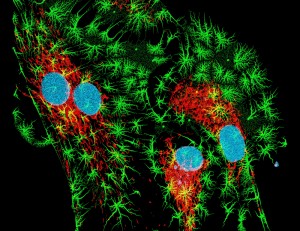 In a recent study titled “A Role for the Mitochondrial Pyruvate Carrier as a Repressor of the Warburg Effect and Colon Cancer Cell Growth” published in the Molecular Cell journal, a team of researchers led by Dr. Jared Rutter, University of Utah, has found that reintroducing the cellular agent mitochondrial pyruvate carrier (MPC) can disrupt colon cancer cell growth.
In a recent study titled “A Role for the Mitochondrial Pyruvate Carrier as a Repressor of the Warburg Effect and Colon Cancer Cell Growth” published in the Molecular Cell journal, a team of researchers led by Dr. Jared Rutter, University of Utah, has found that reintroducing the cellular agent mitochondrial pyruvate carrier (MPC) can disrupt colon cancer cell growth.
Many anti-cancer therapies are aimed at hampering tumor cell growth, and while some of them attempt to shut down proteins or agents feeding the tumors, others insert natural cellular agents that have the capacity to destroy tumor cells.
MPC is one of the mechanisms used by our organism in an attempt to fight cancer. This carrier acts by reducing the Warburg effect, a biological phenomenon where cells are able to change their own metabolism to maintain an uncontrolled growth and ultimately become cancerous.
One of the key metabolic changes in this process is the presence of the metabolite pyruvate, which enters the mitochondria and allows cells to continue their energy production. However, in cancer cells, instead of entering the mitochondria, pyruvate goes to an alternative metabolic pathway, which results in cell-building material.
As such, MCP has the ability to prevent pyruvate from diverting its normal pathway, forcing its entry into the mitochondria. For this reason, cancer cells naturally try to eliminate MPC from cells, explaining why in may types of cancers, such as brain, breast and colon, there are significantly low levels of MPC when compared to healthy tissues. Furthermore, this decrease is more prominent the more aggressive a tumor becomes.
The research team found that upon introduction of MPC into colon cancer cell lines, their cancer properties were lost, including cell division and expression of stem cell markers.
Furthermore, upon injection into in vivo mice models, cells that contained MPC had a significantly reduced capacity of homing to tissues and developing tumors, and when they did, tumors derived from cells containing MPC were significantly smaller than those derived from cells who did not have MPC.
“This makes sense because MPC is a pinch point in metabolism. Our work, taken together with that from many other laboratories shows that most cancer cells are completely reliant on this unusual metabolism known as the Warburg effect,” Dr. Rutter explained in a press release.


